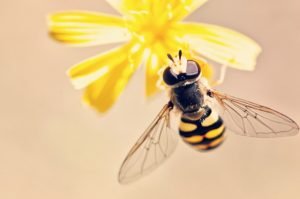Tip: Your first port of call when removing bees is to contact your local beekeepers. Their contact details can be found online or in the Yellow Pages.
At this time of year many people will find bees a problem, especially when they swarm, therefore, using the right method of pest control is very important. With the decline in bee populations it seems a shame to exterminate them when they do in fact provide us with the necessary services of pollinating plants and flowers, and of course making honey.

A solitary bee many inadvertently find its way into your premises and can be shushed outside relatively easily. If it’s a little stubborn you can always place a glass over it, slide a piece of paper under the glass and let it free outside. However, if you, or a member of your household, has an allergy to bee stings it’s wise to get rid of it as quickly as possible. Unlike wasps or hornets, bees won’t sting unless they are aggravated; it’s their last method of self-defence. You can use chemical sprays if needs must.
Swarms of bees can be extremely scary, the sheer number of bees and their noise should alert you to their whereabouts, typically a tree, but they may also take a fancy to your chimney stack or a wall cavity. Never try and approach swarming bees as they are liable to sting and we’re not talking one or two stings here!
Local bee keepers will be able to help you and will relish a phone call. They’ll come and assess the situation and tell you whether they want to take your bee swarm or nest away to replenish their own beehive stocks. If the bees are in your chimney don’t try and smoke them out; in reality it’s rarely successful and the chances are they’ll return, especially if they have built honeycombs.
For commercial premises, such as schools or hospitals, pest control companies may be able to help. However, they may exterminate the bees as a last resort, so remember beekeepers will usually offer a free service and keep the bees alive to make honey and help pollinate fruits and vegetables for us.
Having said that, if you’re responsible for a public external or internal space you may well have a duty of care to help protect the public for what could potentially be a life threatening situation (for those who are allergic to bee stings) and should therefore consult pest control experts.
If you are looking for advice on pest control for bees, please contact us.

